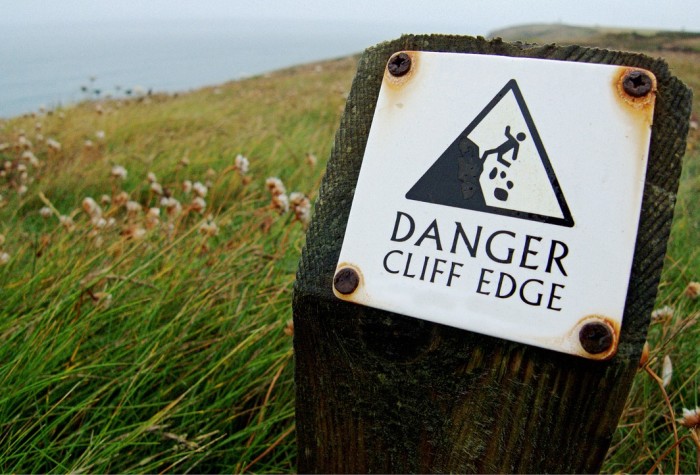(Editor’s note: The following are Chelsen Vicari’s remarks prepared for her address, “The Twisted Gospel,” to the Regent University School of Government on April 6, 2017.)
When I arrived at Regent University for graduate school in 2009 I brought with me the belief that same-sex relationships could possibly be reconciled with Christianity, a loyalty to the modern feminist movement, appreciation for socialist liberation theology, and a pursuit of social justice purchased at the price of Gospel truths. I also harbored some criticisms of American exceptionalism and the nation-state of Israel.
While I probably couldn’t have given you intellectually honest explanations for why I held this worldview, I did know my opinions were fashionable cultural and political trends that I not only picked up at my secular liberal arts college, but from some at the Christian campus ministry I attended while there.
So what in the world was I doing studying at Regent University, a conservative Evangelical Christian school? Yes, I asked myself that too once I arrived. The short answer: scholarship funds. But I’ve come to see over the time the actual reason was God’s Providence.
To be clear, I was raised with a deep appreciation of the Church. Christianity itself is not something I ever doubted or considered abandoning.
Sure, once I arrived at college, a secular liberal arts school, my Christian faith was challenged. But these challenges faced in the classroom by my Atheist biology professor didn’t bother me so much. I believed in God the Creator. He didn’t. We weren’t going to change each other’s minds.
The tougher challenge for me came when professing Christians starting questioning my traditional principles and worldview.
During my junior year I plugged into a wildly popular interdenominational campus ministry. It should have struck me as odd that our campus pastors’ sermons steered clear of complex and controversial Christian teachings. Concepts of human depravity, sin, transformation, authority and Hell were hardly ever discussed by our small group leaders and teachers. To be clear, there were no blatant liberal creeds in the sermons or instructions to vote for President Obama in the ’08 elections. Instead, there were some individuals within leadership that prioritized concepts of love and grace while minimizing absolute truths, the authority of Scripture, and traditional moral ethics.
At first I could tell this was a different kind of theology than what I was used to. I pushed back a little on some things. But ultimately, my biggest fear was of being ostracized by my new Christian friends. My biggest problem was that I was completely unprepared to recognize when teachers veered away from traditional Christian teachings.
By the end of my senior year, due in part to a lack of knowledge and painful experiences, I started to embrace a liberal paradigm in the name of Christianity. Failing to see how that paradigm was actually working contrary to Christianity. Convinced that my progressive faith was more righteous than the backwards, outdated, uncompassionate Christianity of my parents. Because how dare they make statements like, “Homosexuality is a sin.” How unloving was that!
As you know, sexuality and gender identity are the prominent cultural issues facing the Church today. Revisionist sexual ethics was definitely my biggest temptation. That’s because I truly loved my gay friends at college. I wanted the best for them. Deep down I secretly had the feeling sex was designed for marriage between one man and one woman. But I didn’t want to hurt my gay friends’ feelings. Plus I dreaded the idea of going against the crowd. Selfishly, I wanted to be affirmed as a good, well-liked person.
I was duped by a twisted version of the Gospel. Here was revisionist theology in an evangelical prism. I wasn’t studying Scripture, but popular bloggers and Rob Bell. I wasn’t considering history, social science, or the complexities of the arguments raised on behalf of traditional Christian sexual ethics.
I just didn’t know enough about the Christian faith to defend it.
Christianity is comprised of two millennia of agreed upon Church teaching on moral ethics. But I chose to exchange said two millennia of Church teaching for the opinions of a few popular authors and bloggers (some with little to no formal theological training). I didn’t do in-depth reading, study primary sources, and consider the ramifications before jumping to a conclusion based on my feelings.
Graduation came and I packed up and moved to attend the graduate school that offered me the most money.
At Regent University my liberal biases were challenged by academic research and Christian apologetics. Here was a graduate program that unashamedly taught in accordance with Church creeds and history and the use of social science to confirm conclusions. Professors who were more concerned with obedience to our Savior than cultural trends.
There were no fiery darts thrown at my liberal biases by other students and teachers, only grace coupled with truth. Professors assigned me to read Charles Colson’s How Now Shall We Live? Another encouraged me read Dietrich Bonhoeffer’s Cheap Grace. It didn’t take long for me to realize I was compromising traditional Christian teachings in pursuit of acceptance.
I learned that protesting unjust social and economic structures is commended and encouraged. But to use caution in placing confidence in revamped Liberation Theology under a social justice veneer. A perfect utopian society is not attainable so long as humanity remains fallen.
I learned that Christians are dying in the Middle East and other corners of the world for the Faith. And few of my progressive Christian friends were protesting or even taking notice. Weren’t we social justice advocates? The silence from the Left is likely because it disrupts their Christian oppressor and Persecution complex narratives. But social justice doesn’t look like ignoring the Persecution of our brothers and sisters abroad because it doesn’t fit our political narrative here at home.
I learned that while not perfect, Israel isn’t the colonial oppressor of victimized Palestinians it’s portrayed to be by some liberal Evangelical figures. I’ve witnessed with my own eyes that democracy, human rights, and religious liberty are thriving in Israel while dying nearly everywhere else in the Middle East.
I learned that liberal churches are dying and conservative churches are thriving. The big beautiful, yet liberal Methodist and Episcopalian sanctuaries in Washington DC waving rainbow flags outside maybe have 30 people in attendance on Sunday morning. Interesting for rather a liberal and diverse city. Yet the Anglican and Southern Baptist church plants who hold to orthodox teachings on sexuality and marriage are growing with vibrancy and diversity.
I am grateful to Regent University’s Robertson School of Government for fostering my skills, my worldview and my contacts to address liberal political agendas within Christian communities and help reform liberal denominations.
Today I work for the Institute on Religion and Democracy, a Christian think tank that challenges American Christians to be faithful to the Church’s historic creeds, and faithful to traditional Christian teachings that prioritize obedience to our Savior over ever-changing cultural and political trends. Trends that are especially tempting to younger Christians, many of whom are being intimidated into undermining their faith for the sake of acceptance.
I am soon to welcome my unborn child into this world. I have no plans to slow down in my ministry. Because what better way to minister to a broken world, than to teach my daughter the urgent call we all have to defend religious freedom, speak up for the sanctity of human life, lend a voice to the Persecuted Church abroad, and be an uncompromising witness for Jesus Christ no matter the cost.
Our Christian tradition tells us to contend for the Gospel. That compromise of Christ’s teaching is never an option. Thank you to my Regent professors and staff who upheld that message and helped instill it in me. I promise to pass it on.





Comment by james Ottjes on April 10, 2017 at 4:37 pm
Very well said Chelsen
Jim Ottjes
Comment by Chelsen Vicari on April 18, 2017 at 4:19 pm
Thank you, Jim. Appreciate that.
Comment by Dawn M. Flower Blundell on April 12, 2017 at 2:10 pm
Hi Chelsen,
Thanks for sharing your story. Mine runs in exactly the opposite direction, actually. Far from accepting a more “progressive” form of Christianity as an effort to be more accepted, or to honor my or anyone else’s “feelings,” it was the product of a hard-fought battle with the Biblical illiteracy and counter-Gospel focus of my evangelical Christian upbringing. I came to learn, once I opened the Bible and began to study it in earnest, that I had been taught a great many falsehoods; once I began to study history fearlessly, I came to see the truth of human beings’ tendency to use faith to make themselves look good, to reject Jesus’ hardest teachings, to act out their religious fervor by persecuting a long, long list of others, to their later shame and regret. It nearly drove me from my faith entirely, these sins committed in the name of the Gospel, until the day when I realize that this is exactly what Jesus preached and taught against…exactly what he died for. And so, I became a pastor, determined to speak the truth.
Embracing a more “progressive” (ugh, what a stupid word) theology absolutely did not win me acceptance anywhere, or win me a single friend. It was never (and still is not) based on anything like “feelings” but rather on fearless critical study of both Scripture and history, together with a lifelong commitment to follow Jesus Christ and every prophet in loving God by loving others.
Blessings on your journey.
Rev Dawn Blundell
PS You might like to explore the Israeli/Palestinian conflict a bit more deeply. It is an extremely complex, many-layered thing. Issues of democracy notwithstanding, the government of Israel has — along with nearly every other nation on earth, at some point in its history — pursued a course of action against the Palestinian people that all the world condemns.
Comment by Nutstuyu on April 18, 2017 at 11:06 am
2 Timothy 4:3New International Version (NIV)
3 For the time will come when people will not put up with sound doctrine. Instead, to suit their own desires, they will gather around them a great number of teachers to say what their itching ears want to hear.
Comment by Nutstuyu on April 18, 2017 at 11:07 am
“Palestine” simply doesn’t exist, no matter how badly you and your progressive friends want it to. It was invented by the Roman Empire to erase all existence of Judaea and the Jews.
Comment by Dawn M. Flower Blundell on April 18, 2017 at 12:22 pm
?? Why would anyone “want” Palestine to exist…? Im sorry, that makes no sense to me.
Comment by Dawn M. Flower Blundell on April 18, 2017 at 12:23 pm
The people who live there certainly think it exists lol.
Comment by Michael Bates on April 17, 2017 at 11:54 pm
Chelsen, thinking back to your Christian upbringing, what would have prepared you to face the leftward cultural pressure you encountered in the campus Christian group? To put it another way, what should parents, Christian school leaders, church youth group leaders be doing differently?
Comment by Chelsen Vicari on April 18, 2017 at 4:17 pm
I’ve been thinking on this subject quite a lot lately as an expectant mom. First thought is a deeper theological education from both home and church. Pop Sunday school lessons and piecemeal Bible stories before bedtime were inadequate, for me anyway. So perhaps earlier introductions to apologetics or catechismic lessons. Talking with other Christian parents, it seems helpful when kids feel called to be heroes to a broken world on behalf of the faith. Instructing children to follow moral and ethical guidelines because “the Bible says so” isn’t enough to prepare children to combat revisionist theology or a culture hostile to Christianity. Any other thoughts?
Comment by Michael Bates on April 18, 2017 at 6:01 pm
“Called to be heroes to a broken world on behalf of the faith” — that’s a great insight, and it’s an attitude that I haven’t seen in the Christian schools and youth groups with which I’m familiar. More often it’s a defensive attitude — how do we keep our kids from being corrupted. I agree with the value of apologetics and catechism, to which I’d add logic, the history of Christianity, and teaching about non-Christian world views. Learning to spot attempts to smuggle non-Christian ideas under cover of Christian terminology would also be valuable.
Comment by SouperGrover on April 18, 2017 at 11:22 am
Chelsen, your path is one very common. One I have similarities to. I always considered myself an “intellectual” and the people in my church…not. I left for college not knowing there were a great many Christian thinkers, never being encouraged to read my Bible. Like you, I had no idea how to defend my Christian beliefs other than “it’s in the Bible”. I fell into the Liberal “save the world” trap as well, and started believing more of the conspiracy theories that Dan Brown and the History Channel put out without ever really cracking my bible open to actually read IT and find out for myself. Within the past year I’ve begun reading my Bible with an open mind and have found apologetics. It was a life changer.
I feel like those of us who have fallen out of faith and then rediscover it are put in a great position to be able to defend it now. God put us on this path in order to let us learn the Truth on our own. I think it’s definitely more solidified for me because of it.
One a side note: Is the Bonhoeffer book you were reffering to “The Cost of Discipleship”? I looked for Cheap Grace and could not find a book by that title. I found the concept of Cheap Grace being mentioned in The Cost for Discipleship, though
Comment by Chelsen Vicari on April 18, 2017 at 4:21 pm
Thank you for sharing a little bit of your story. I would love to see more apologetics implemented in Evangelical children’s Sunday school lessons, home study with parents, etc.
Comment by BWF on May 16, 2017 at 5:04 pm
Do you really have faith in the Gospel of Jesus? Or are you placing your faith in an anti-liberal, right-wing political agenda?